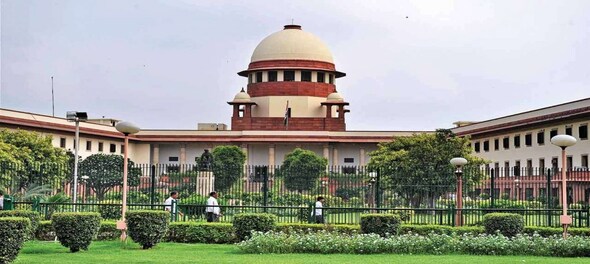
The Supreme Court expressed concern over the “misuse” of the sedition law and unaccountability of executive agencies and asked the Centre if the “colonial law” was still needed 75 years after Independence.
Chief Justice of India N V Ramana said the British-era law was used against leaders such as Mahatma Gandhi and Bal Gangadhar Tilak to suppress the Indian freedom movement.
The apex court will now examine the validity of the sedition law and is meanwhile seeking the Centre’s response over it.
What is the sedition law?
Section 124-A of the Indian Penal Code (IPC) introduces and deals with the offence of sedition in the constitution. It is a non-bailable provision, meaning it does not allow the person to seek bail in anticipation of the arrest. British official Thomas Babington Macaulay drafted and included the provision in the IPC in 1870.
The provision states: "Whoever, by words, either spoken or written, or by signs, or by visible representation, or otherwise, brings or attempts to bring into hatred or contempt, or excites or attempts to excite disaffection towards, the government established by law in India, shall be punished with imprisonment which may extend to three years, to which a fine may be added; or, with fine."
Why is the Supreme Court concerned?
The top court expressed concern over the “misuse” of the sedition law and the lack of accountability of executive agencies while hearing a plea filed by Major-General S G Vombatkere (Retd).
In his plea, the petitioner alleged the sedition law violates the freedom of speech and expression and is disproportionate to the object it seeks to achieve.
During the hearing, CJI NV Ramana turned to Attorney General KK Venugopal and said, “It’s (sedition law) a colonial law. It was meant to suppress the freedom movement. The same law was used by the British to silence Mahatma Gandhi, Tilak etc. Still, is it necessary after 75 years of independence? Our concern is a misuse of the law and no accountability of the executive.”
The CJI said the “enormous power of this section can be compared to a carpenter being given a saw to make an item, (but) him using it to cut the entire forest instead of a tree. That’s the effect of this provision.”
He also said that the conviction rate of the people charged under the sedition law is very low.
1962: Kedar Nath Singh vs State of Bihar case
Former Union Minister Arun Shourie has also urged the SC to take a decision on the validity of Section 124-A. He filed a petition Thursday seeking the law be declared unconstitutional as it has been "heavily abused".
The petition cited the Kedar Nath judgement (1962) in which the top court had held that a citizen has the right to say or write whatever he likes about the government or its measures by way of criticism so long as he does not incite people to violence against the government or with the intention of creating public disorder.
But the “police continues to register cases against citizens who are exercising their right to freedom of speech and expression," the plea said.
Centre's stand
Attorney General KK Venugopal, during the SC hearing on Thursday, said it might not be necessary to strike down the provision and "only guidelines need to be set out so that section meets its legal purpose".
Recent sedition cases
Another petition in the matter—filed by senior journalist Sashi Kumar—has underlined that there has been a “dramatic jump in charging a person with the offence of sedition since 2016.”
Here are some of the recent cases where sedition charges were slapped by authorities:
Ayesha Sulthana: Lakshadweep native, activist and filmmaker Aisha Sultana was booked under the sedition law for calling the Union Territory’s administrator Praful K Patel a “bioweapon”. The charge was made on the basis of a complaint raised by the BJP Lakshadweep president C Abdul Khader Haji, who said Sultana had criticised the Centre and Patel during a Malayalam news channel debate over the 'political crisis' in Lakshadweep.
Siddique Kappan: Suspected to be linked to the Popular Front of India (a radical group), Kappan and his alleged associates were arrested on October 5, 2020, while they were on their way to UP’s Hathras following the murder of a girl. They were held for 'breach of peace' and booked under the Unlawful Activities (Prevention) Act.
In June, a court in Uttar Pradesh observed that the police failed to complete the probe within six months and dropped the charges related to breach of peace.
Vinod Dua: The senior journalist was slapped with the sedition charge after he uploaded a video to YouTube last year criticising the Narendra Modi government’s handling of the Covid-19 lockdown. In June, the SC quashed the sedition case registered against him.
Disha Ravi: In February this year, the Delhi Police charged Ravi with Section 120B (criminal conspiracy), Section 124A (sedition), and Section 153A (Promoting enmity between different groups on grounds of religion, race, place of birth, residence, language, etc., and doing acts prejudicial to maintenance of harmony).
“Disha Ravi, arrested by CyPAD unit of Delhi Police, is an Editor of the Toolkit Google Doc & key conspirator in document's formulation & dissemination. She started WhatsApp & collaborated to make the Toolkit doc. She worked closely with them to draft the doc,” the Delhi Police said.
Later, the Delhi trial court granted her bail saying “mere engagement with persons of dubious credentials” is not a crime.
Check out our in-depth Market Coverage, Business News & get real-time Stock Market Updates on CNBC-TV18. Also, Watch our channels CNBC-TV18, CNBC Awaaz and CNBC Bajar Live on-the-go!


PM Modi files nomination for 3rd term from Varanasi Lok Sabha seat
May 14, 2024 10:15 AM
Lok Sabha elections: 4th phase sees over 68% voter participation, West Bengal leads with 76% turnout
May 14, 2024 1:47 AM

